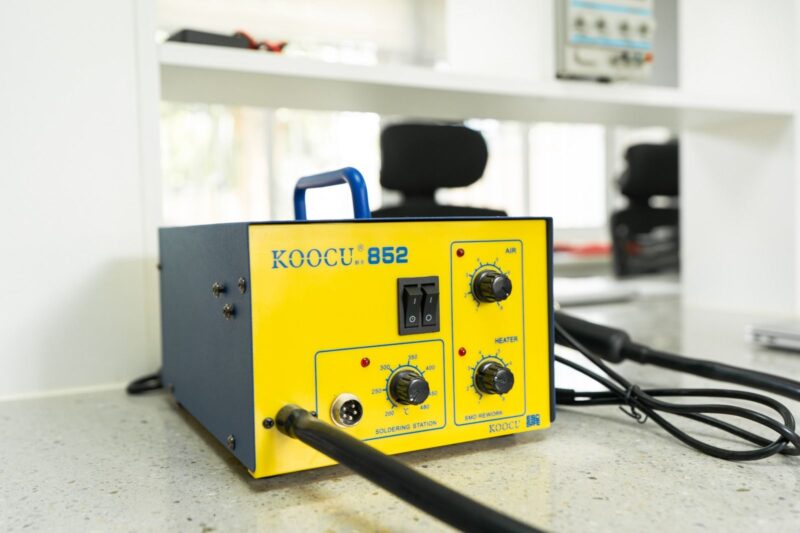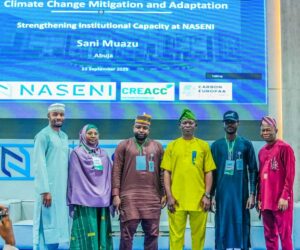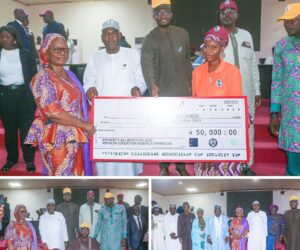When Khalil Suleiman Halilu assumed office as the Executive Vice Chairman and CEO of the National Agency for Science and Engineering Infrastructure (NASENI) in September 2023, he made a bold promise that “Nigeria would no longer remain a nation that only consume what others produce”
He said under his watch, NASENI would evolve into a producer of technologies that Nigerians can buy, use, and export. Two years later, that promise is taking firm shape, not in boardroom presentations or policy documents, but in the form of tangible products now emerging from NASENI’s factories into markets.
The young, reform-driven CEO has positioned NASENI as a key pillar in Nigeria’s quest for industrial resurgence. His approach anchored on transparency, innovation culture, private-sector engagement, and accelerated technology transfer has begun to transform the agency from a previously quiet research institution into a visible player in national industrial development.
SPONSOR AD
Today, NASENI boasts of a robust catalogue of commercialized technologies ranging from solar irrigation systems and electric mobility devices to home appliances, ICT hardware, and medical diagnostic tools. These are not prototypes or pilot models; they are real products that Nigerians are purchasing and using in their daily lives.
Halilu, who often speaks of technology as a tool for national liberation, insists that Nigeria must take ownership of its industrial destiny. In several public engagements, he has stressed the importance of local production.
“Nigeria cannot prosper by importing everything it uses,” he said during one of NASENI’s innovation showcases. “Our mandate is to give Nigerians products made by Nigerian minds and Nigerian hands, at prices they can afford, and in a manner that builds national capacity.”

This philosophy explains why NASENI’s focus in the last two years has shifted intensely toward commercialization where research outcomes are turned into market-ready products that can drive economic growth.
One of the most visible areas of progress is the energy sector, where NASENI has rolled out a suite of solar-powered technologies designed specifically for Nigerian households and farmers. For decades, unreliable electricity supply and high fuel costs have crippled rural productivity.
NASENI’s solar irrigation pumps are helping to change that narrative. Designed with affordability and durability in mind, the pumps are being deployed by smallholder farmers across northern Nigeria.
In addition to irrigation pumps, NASENI’s solar home systems, ranging from solar panels to inverters and power kits, are gradually making inroads into rural communities. The CEO has emphasized that millions of Nigerians remain underserved by the national grid, and that decentralized, affordable solar solutions are essential for equitable energy access.

He argues that the country cannot rely on imports alone. “We are building systems that take into account our climate, our economic realities, and our local supply chain,” Halilu said during a recent tour of the agency’s Solar Manufacturing Plant. “That is why these products are both affordable and durable.”
Beyond energy, NASENI’s drive into the mobility sector is attracting wide national attention. Under Halilu’s leadership, the agency is pioneering Nigeria’s clean mobility future with the introduction of electric tricycles, electric bicycles, electric motorcycles, and compressed natural gas (CNG) conversion kits.
With the rising cost of petrol and the urgent need for environmentally friendly transport alternatives, these innovations could not have come at a better time. NASENI’s electric tricycle, popularly called the e-keke, is perhaps the flagship product in the category. Built for Nigeria’s rugged terrain and harsh climatic conditions, it offers a cheaper and cleaner alternative to petrol-powered tricycles.

Transport unions in major cities like Abuja have already shown interest in adopting the e-keke. Also, electric motorcycles produced by NASENI are also gaining traction among logistics and delivery companies. With the rapid growth of e-commerce and food delivery services, affordable electric motorcycles present a compelling business case.
Halilu has repeatedly stated that Nigeria must not miss the global shift toward electric mobility. “The rest of the world is moving, and we cannot remain behind. The technologies we commercialize today must prepare Nigeria for the next 20 years, not the last 20 years,” he said.
The Agency’s ’s push into home appliance manufacturing is another strategic intervention driven by the CEO’s belief that Nigeria’s consumer market, one of the largest in Africa must be fed by domestic production rather than imports. Refrigerators, air conditioners, microwave ovens, blenders, and water dispensers produced by NASENI are slowly entering public markets, government procurement channels, and institutional buyers.
These products represent a symbolic but significant victory for local manufacturing. For decades, Nigerian households have relied largely on foreign brands, draining foreign exchange and weakening local industries. Halilu believes this must change.

“Why should Nigerians buy products entirely imported from Asia when we have the capacity to build them here?” he asked at a recent product exhibition. “Every refrigerator or air conditioner produced locally means jobs for our young people and savings for our economy.”
The health sector is another area where NASENI has made notable strides under Halilu’s watch. The establishment of the NASENI–Troment Rapid Diagnostics Factory and the commercialization of rapid test kits signal a major step toward health security. Diagnostic tools are among the most imported medical commodities in Nigeria.
Local production means quicker availability during outbreaks, lower costs for patients, and reduced dependence on foreign suppliers. A senior health researcher who recently toured the facility described it as a breakthrough. “If Nigeria can produce its own rapid test kits, we will save billions and strengthen our health system. This is a major milestone.”

Furthermore, in an era where Nigeria’s digital economy is expanding rapidly, NASENI under Halilu has ventured into the production of laptops, tablets, smartphones, smart TV boxes, and STEM learning devices.
These locally assembled devices are particularly targeted at schools, government institutions, and young professionals. For a country where imported ICT hardware dominates the market, this marks a strategic shift.
The educational technologies developed by NASENI such as robotics kits, STEM learning tablets, and mini laboratory devices reflect Halilu’s belief that Nigeria’s next generation must have practical exposure to science and engineering.
He insists that preparing young Nigerians for a globalized digital future requires hands-on learning tools produced within the country. “We cannot build the future if we don’t empower the young people who will live in that future,” he said during an educational technology demonstration.
In the manufacturing and industrial hardware category, NASENI has commercialized inverters, UPS units, voltage stabilizers, and key electronic components used by businesses and households. These products support small and medium enterprises, reduce downtime caused by power fluctuations, and strengthen local supply chains.
Across all these developments, one theme runs consistently, Halilu’s determination to transition NASENI from a research-focused institution to a commercially active, industry-shaping organization.
Analysts say the progress recorded so far reflects an agency that is beginning to find its footing as an engine of national technological development. What distinguishes this moment is that NASENI’s achievements are visible, measurable, and impactful.
If the current trajectory continues, the label “Made by NASENI. Made in Nigeria” may soon become a familiar imprint in homes and industries across the country. And for Halilu, the man steering this transformation, that vision is not just an aspiration; it is a mission anchored on delivery, impact, and national pride.
As a Nigerian living here or in the diaspora, DO YOU HAVE A PLAN B? Just in case anything goes wrong, is there a side business you can fall back on? We show you step by step how you too can start earning US Dollars consistently. Nigerians can now make as much as $20,000 to $35,000 with premium domains. Ideal for business owners, entrepreneurs, and workers.
Click here to find out how it works








